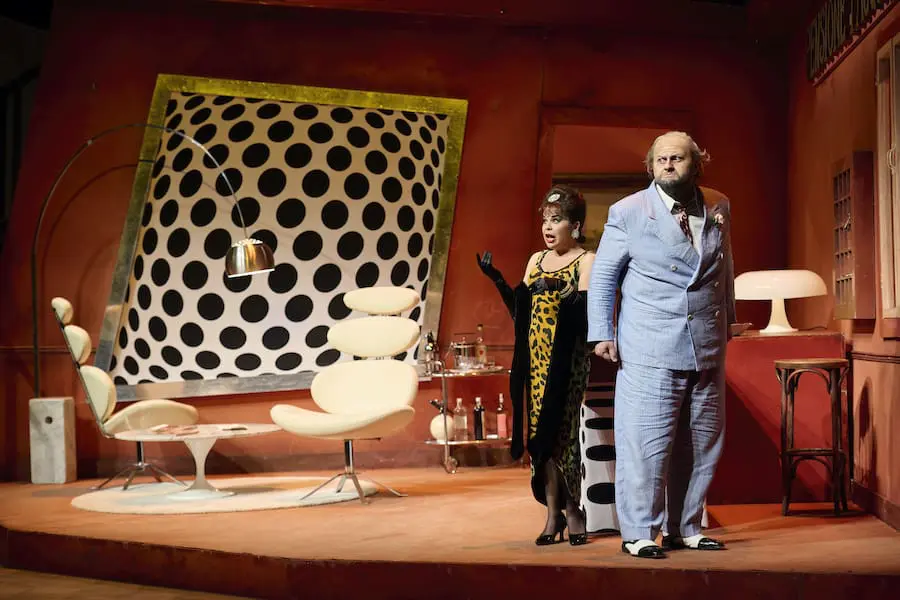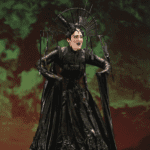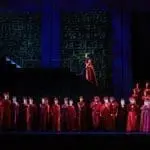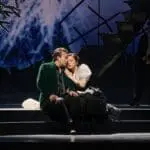If you find yourself in search of a good few hours of worry-free merriment, the return of Don Pasquale to the Canadian Opera Company (COC) after a thirty-year absence will be all the balm you need. Donizetti’s charming, satisfying comedy lands with us in a production new to the COC conceived by the creative duo André Barbe and Renaud Doucet (first created for Scottish Opera in 2014). While I admit I am partial to rogue directorial interpretations, this is a particularly successful kind of reimagining: not overly fussy about false ideas of fidelity to an “original” work, but neither so absorbed in a conceptual vision that it demands ongoing mental gymnastics from the audience. Misha Kiria, making his COC mainstage debut, and excelling in the parlante style so idiosyncratic to the buffa genre, is a perfectly shabby, grumpy Don Pasquale, here cast as a (tragically allergic) cat lover operating a rundown pensione (boarding house) in 1960s Rome. Alterations to the plot are thoughtful and well-placed, and combining subtle, pinpointed comic touches and a streak of farce projects throughout the kind of clever, precise design that one might associate with a Marx Brothers comedy.
Visual and sonic details are judicious and rarely overdone, except when it serves the plot: ambient Italian café noise rumbles through the audience briefly, offering a short immersive sensory experience without being overbearing; lighting (designed by Guy Simard) becomes a visual vehicle for melodrama, sudden moments of darkening seeming as if an innate response to an emotional shift in the drama. More vibrant technicolor touches, like the cluster of neon-green cat statues, or the pensione’s makeover according to the newly-married Norina’s fashionable agenda, all contribute to the overall effect without excess. Projections during the overture are practically to be expected these days, but are put to use to excellent effect here, laying out Barbe & Doucet’s concept clearly and early without overdoing the fact. Static slides in the style of the fotoromanzo (literally “photo novel,” a sequential form of storytelling a little like a photographic comic strip, popular especially in women’s magazines in mid-century Italy) introduce us to the updated setting and the central conceit of the plot.
The vortex shape of the buildings constructed on stage at somewhat vertiginous angles is suggestive of the haphazard happenings within, both the general imbroglio of the plot’s intersecting machinations and sub-conspiracies, and the permanent state of friendly disarray in which Il pensione Pasquale exists. Plenty of frivolity sustains the physical humour: Joshua Hopkins as the busily scheming Dr. Malatesta particularly succeeded in well-timed gestures, and a memorable passage is the full minute of Pasquale desperately pressing the bell to summon his beloved ancient porter, only to be faced with a seemingly never-ending stream of characters possibly emerging directly from a Wes Anderson film.
Simone Osborne sparkles and delights as the (quite literally) catty and sharp-witted Norina. Her entrance scene singing from the terrace had us momentarily worried, as one of the few drawbacks of the otherwise well-crafted set is a noticeable loss of volume in the upper section. Back on level ground, however, she soon had the chance to exhibit both her first-rate acting and a wonderfully deft and flexible coloratura. As her frustrated and rather pitiful love interest, Santiago Ballerini brings a shining tenor voice to the role, his talent for bel canto well in evidence with a lightness of tone that doesn’t lack for depth. He captured superbly Ernesto’s default “woe is me” mode of heartsick lamenting, both in the tender Act I aria “Sogno soave e casto,” and the Act II farewell “Povero Ernesto!,” the latter of which is so devastatingly piteous that I can never but think of it as a surreptitious, tongue slightly in cheek satire of the sentimental style.
Most importantly, despite passages of rhythmic disagreement between stage and pit in the first act, the cast form a cohesive and skilled buffa ensemble, a treat of a performance that comes across as genuinely enjoyable for all involved. Although the chorus is used only sparingly, and peripheral characters are mostly silent comedic roles, this perhaps reflects the fact that the opera features fewer arias than in typical opere buffe—including Donizetti’s earlier (and today more frequently performed) hit L’elisir d’amore. Enough to showcase the principal singers’ fioritura skills—certainly in abundance here—but not a sequence of showstoppers. Rather, the real magic is in the pairs; Osborne and Hopkins make for a consummate, fizzing conspiratorial duo, Osborne and Ballerini shine in their nocturnal declarations of love, and Hopkins and Kiria play off each other very well, triumphing in the wickedly fast patter of the opera’s beloved duet, “Cheti, cheti, immantinente.” The COC orchestra meanwhile, here under Jacques Lacombe, continues its streak of fine playing this season, sensitive to dramatic contrasts throughout.
What this production achieves—and which is bolstered still further by the all-round exuberant performances—reflects a sound understanding of translating comedy and satire for modern audiences, taking a cue from how successive generations have used the stock characters of the commedia dell’arte. Careful attention is paid to render the conventions and mechanisms of nineteenth-century Italian comic opera applicable in novel contexts: the premise, ultimately, is not all that radical (the cat-plot doesn’t really add much, for instance, though it’s a charming frame), but its execution is effective and satisfying.
In more lofty terms, Barbe & Doucet’s artist statement sums up their goal of creating productions that exist “somewhere between the sacralization of a work, which kills it by rendering it inviolable and the betrayal of a work, which only corrupts it.” Treading this line successfully has here created space for this spirited cast of performers to offer a compelling and thoroughly delightful delivery of an opera that I hope will become a more regular feature on the COC stage.
Related Content ↘
Opera Canada depends on the generous contributions of its supporters to bring readers outstanding, in-depth coverage of opera in Canada and beyond. Please consider subscribing or donating today.















